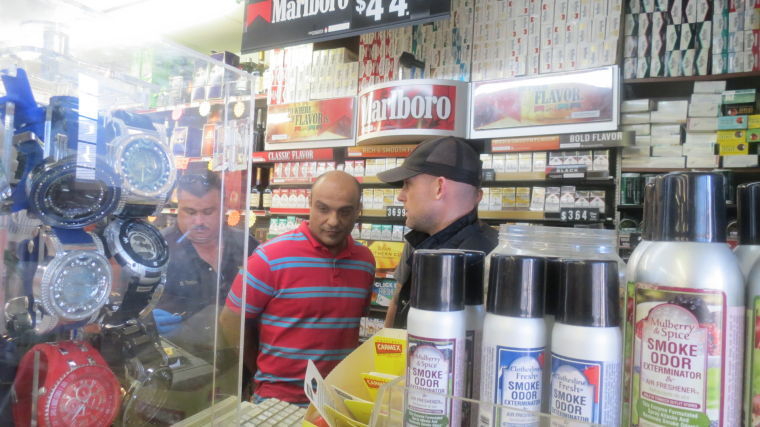
Anatomy of a BUST: Authorities seize bath salts
July 2, 2013
Terrebonne, St. Mary ban fireworks; limited use in Lafourche
July 2, 2013A U.S. Supreme Court decision that struck down a long-standing provision of the Voting Rights Act, meaning federal pre-approval for new district lines or other voting changes, will have a rapid impact on Tri-parish people whose job is to see that elections run smoothly and according to the law.
But interviews with attorneys and public officials indicate that a long-contested issue in one local parish will not be affected by the landmark Shelby County Alabama vs. Holder ruling.
The decision invalidated a key provision of the Voting Rights Act, Section 4, which contains a formula for determining which states and communities require pre-approval by the U.S. Department of Justice for changes related to voting such as district boundaries or polling place locations.
In Terrebonne Parish, officials just last week sought DOJ approval for a change in polling places, necessitated by closure and consolidation of some schools, thus requiring new placement of voting machines.
“It will have a major effect on our office,” said Terrebonne Clerk of Court Theresa Robichaux. “There is a tremendous amount of footwork and paperwork that has to be done when a precinct is relocated. It will save us a tremendous amount of time in the future. For this we had to scramble to get work done in time, it takes about six months for Justice Department approval.”
While the approval point may be moot, Robichaux and others in Terrebonne government said they would rather err on the side of caution. Terrebonne has recreation district millage items on its ballots for October. Requests for pre-clearance are also on the DOJ workload for Lafourche Parish, which may now become moot as well.
The basis for the Court’s decision was, simply, that times had radically changed.
In 1965,when the Voting Rights Act was signed into law, there were tremendous gaps between the numbers of black people who were registered to vote as opposed to whites. Poll taxes, literacy tests and outright intimidation and harassment were the rule rather than the exception in the Old South. In Mississippi, freedom riders who sought to aid registration of black voters were murdered. In Louisiana, even in places where there was not outright intimidation, blacks recall fearing registration. Many in Terrebonne and other parishes in the sugar belt lived on plantations in worker housing, and were concerned that taking to the polls could result in their becoming unemployed and evicted.
Writing for the 8-1 majority, Chief Justice John Roberts said the law as written is “based on decades-old data and eradicated practices.”
“The formula captures States by reference to literacy tests and low voter registration and turnout in the 1960s and early 1970s. But such tests have been banned nationwide for over 40 years,” the opinion states. “Voter registration and turnout numbers in the covered States have risen dramatically in the years since. Racial disparity in those numbers was compelling evidence justifying the preclearance remedy and the coverage formula. There is no longer such a disparity. In 1965, the States could be divided into two groups: those with a recent history of voting tests and low voter registration and turnout, and those without those characteristics. Congress based its coverage formula on that distinction. Today the Nation is no longer divided along those lines, yet the Voting Rights Act continues to treat it as if it were.”
The problem, as the Court sees it, is that while the practices in certain states justified an unusual singling out in the writing of the law – an unusual remedy to an unusual problem – the evidence shows that to no longer be the case. Voting rights issues related to race still exist, the Court states. But Congress, if it wishes to address that issue, must come up with a plan more suited to current problems and practices. To do otherwise, the Court reasoned, would be subjecting specific states to undue hardships because of broad painting with the Congressional brush.
Terrebonne Parish Chief Judge David Arceneaux read the decision with great interest, noting that “In terms of the pre-clearance, as a practical matter, to strike it all down would be inevitable. Local officials can now go about their business of modifying laws and making changes to voting practices without the advance permission of the federal government. It seems to me as I read it that any local official or Legislature could decide to change the law, but that doesn’t prevent the Justice Department from coming in and challenging the change. The burden would then be on the Justice Department and not the state … It is an interesting case to read and a simple case to understand.”
In Lafourche and St. Mary parishes, election officials also welcomed the decision, noting that the amount of work required for pre-clearance, and most of all the time it takes, is burdensome.
What the decision will not affect is the ability of Terrebonne Parish activists and advocates continue their press for a minority judgeship district. If and when such a measure passes the legislature or is created with the blessing of the local judiciary, an event that all sides agree is not likely to occur without litigation, that district itself would not be subject to pre-clearance, but could be challenged later.
Activists like Terrebonne NAACP President Jerome Boykin say the parish’s election of judges for all five of its court divisions at large – meaning everyone in the parish votes for each – dilutes the desires of black voters. The presumption is that black voters may choose a black candidate, although that is not the stated goal of the proposal. Supporters say the answer is creation of a special district with a strong representation of minority voters that will permit a candidate more appealing to black voters a chance to win. The timing is crucial, Boykin and others say, because Judge Timothy Ellender will retire in 2014, leaving a division of court open.
The suggestion has seen strong opposition from the members of the local bar. And a bill floated in a 2011 legislative session by former Rep. Damon Baldone went down in flames, largely due to strong opposition voiced by another local lawmaker, Gordon Dove, R-Houma.
“The Terrebonne Parish Branch of the NAACP will continue to fight for a minority judgeship and we would never ever give up on that fight,” Boykin said last week. “We saw a case in Georgia where a similar case was won, where there were a lot of at large seats and you didn’t have African-American representation. Voters voted along racial lines. The NAACP Legal Defense Fund took that case and they won. Yes, we plan to move forward with litigation for a minority judgeship.”
The allegation that voting rights are jeopardized by the current method of electing judges in Terrebonne is based on Section 2 of the Voting Rights Act, which attorneys interviewed last week said is not affected by the Supreme Court decision.
Natasha M. Korgaonkar, a staff attorney for the NAACP Legal Defense Fund said it is “disappointing: that voters in Louisiana and other jurisdictions have lost the protection the stricken Voting Rights Act provision provided.
“Before 2006, when that section was reauthorized, not one redistricting plan in Louisiana had been pre-cleared in the first instance. In 2006 for each redistricting of the House of Representatives within the state the Department of Justice found discrimination in the proposed plan, to the detriment of voters throughout the state including southern Louisiana. It is a tremendous loss that provides a great example of why the law is so important. It has prevented intentional discriminatory redistricting on a parish-wide basis and locally,” she said. “In terms of redistricting for a judgeship in Terrebonne Parish, voters in Terrebonne can still create a minority judgeship. Section 2 is not affected and a lawsuit can still be filed. But Section 2 cases are not a substitute for Section 5 pre-clearance.”










